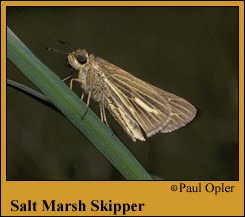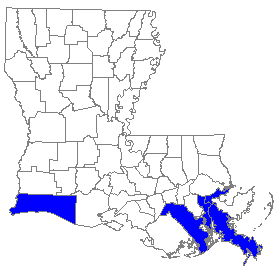 |
 

 |



Salt Marsh Skipper (Panoquina panoquin [Scudder])
Wing span: 1 3/16 - 1 1/2 inches (3.5 - 3.9 cm).
Identification: Forewings are pointed. Wings are dark brown. Upperside of forewing has a few pale spots. Underside of hindwing has yellow veins and a short white bar at the end of the cell.
Life history: Males perch to wait for receptive females.
Flight: Two broods from May-August in the north; three broods from April-October in the south; several broods from February-December in Florida.
Caterpillar hosts: Seashore saltgrass (Distichlis spicata).
Adult food: Nectar from flowers including privet, sweet pepperbush, red clover, gumweed, lippia, salt marsh fleabane, blue mistflower, thistle, and verbena.
Habitat: Coastal salt and brackish marshes, occasionally nearby fields and wood edges.
Range: Along the immediate Atlantic Coast from Long Island, New York south to Florida and the Keys; west along the Gulf Coast to South Texas.
Conservation: Not usually required.
The Nature Conservancy Global Rank: G5 - Demonstrably secure globally, though it may be quite rare in parts of its range, especially at the periphery.
Management needs: None reported.
References:
Opler, P. A. and G. O. Krizek. 1984. Butterflies east of the Great Plains. Johns
Hopkins University Press, Baltimore. 294 pages, 54 color plates.
Scott, J. A. 1986. The butterflies of North America. Stanford University Press,
Stanford, Calif. 583 pages, 64 color plates.
Author: Jane M. Struttmann
State and Regional References:
Lambremont, E.N. 1954. The Butterflies and Skippers of Louisiana. Tulane
Studies in Zoology 1:127-164.
Layberry, R.A., Hall, P.W. & Lafontaine, D.J., 1998. The Butterflies of
Canada. University of Toronto Press, Toronto, ON. 280 pp.
Opler, P.A. 1998. A field guide to eastern butterflies, revised format.
Houghton Mifflin Co., Boston.

